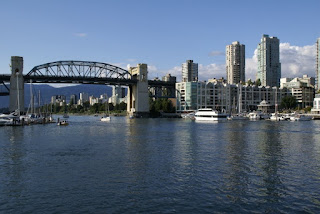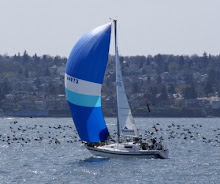 Since moving to the Vancouver area in early 2006, I've walked across the Burrard Street bridge many times admiring the scenery from that vantage point but also admiring the architecture of the bridge itself. Here are some photos I took Saturday to illustrate the architectural features of the bridge. At the end of the post I'll provide a bit of it's background history.
Since moving to the Vancouver area in early 2006, I've walked across the Burrard Street bridge many times admiring the scenery from that vantage point but also admiring the architecture of the bridge itself. Here are some photos I took Saturday to illustrate the architectural features of the bridge. At the end of the post I'll provide a bit of it's background history.


 This is the bust of Captain George Vancouver on a prow on the west side of the bridge. The bust of Sir Harry Burrard-Neale is found on the east side.
This is the bust of Captain George Vancouver on a prow on the west side of the bridge. The bust of Sir Harry Burrard-Neale is found on the east side.




 The Burrard Street bridge consists of six lanes for vehicular traffic plus a divided walkway on eather side of the bridge for bikes and those on foot. The bridge was designed by George Lister Thornton Sharp of Sharp & Thorton in Vancouver. The engineer was John R. Grant. It was designed in the Art Deco style in vogue from 1910 through the 1930s. Its approach spans are Warren deck trusses and the centre span reverses to a Pratt truss to allow for shipping. The bridge has numerous architectural and sculptural features such as the torch-like entrance plylons (see photo), decorative street lamps, the busts of Captain George Vancouver and Sir Harry Burrard-Neale in ship prows. The bridge was opened to the public by Mayor Louis D. Taylor on a Friday afternoon, July 1, 1932 and connected dpwntown Vancouver with the southwest suburbs in Kitsilano. Google to find out more about the bridge, its architects, history and current situation. Wikipedia would be a good starting point. That is where most of this background history came from.
The Burrard Street bridge consists of six lanes for vehicular traffic plus a divided walkway on eather side of the bridge for bikes and those on foot. The bridge was designed by George Lister Thornton Sharp of Sharp & Thorton in Vancouver. The engineer was John R. Grant. It was designed in the Art Deco style in vogue from 1910 through the 1930s. Its approach spans are Warren deck trusses and the centre span reverses to a Pratt truss to allow for shipping. The bridge has numerous architectural and sculptural features such as the torch-like entrance plylons (see photo), decorative street lamps, the busts of Captain George Vancouver and Sir Harry Burrard-Neale in ship prows. The bridge was opened to the public by Mayor Louis D. Taylor on a Friday afternoon, July 1, 1932 and connected dpwntown Vancouver with the southwest suburbs in Kitsilano. Google to find out more about the bridge, its architects, history and current situation. Wikipedia would be a good starting point. That is where most of this background history came from.As an aside, there are two buildings in the town I lived most of my life, London, Ontario. One is the Canada Trust Building of 1931 and the Dominion Building of 1936. Both are in the Art Deco style and are heritage sites. There are examples of Art Deco style across North America and elsewhere in the world originating from the about the same time period. Enjoy the photographic examples above. - Volker

























m.jpeg)



-3.jpg)














No comments:
Post a Comment